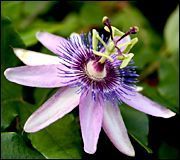The most important relationship I seek to nurture in the treatment room is the one a patient has with their own body. We live in a culture that teaches us to override pain, defer to outside authority, and push through discomfort. Patients often arrive hoping I can “fix” them, but the truth is, we can’t do the work for them. We can offer guidance, insight and support, but healing requires their full participation.
Herbs & Botanicals
Passion Flower (passiflora incarnata)
What is passion flower? What is it used for?
Passion flower, or passiflora, is a perennial creeping vine native to the southern United States, Mexico, Central and South America. The plant's name dates back to the 17th century, when Spanish missionaries first encountered the plant and compared its purple and white blossoms and other elements to the passion of Christ. The leaves, stems and flowers are all used medicinally.
Traditionally, passion flower was used by Native Americans as a sedative. It is used in much the same way today; the German Commission E has approved the use of passion flower to treat nervous restlessness and exhaustion. It is also incorporated into many dietary supplements designed to promote sleep. It is frequently combined with valerian, lemon balm and other herbs to ease pain and tension and help people fall asleep. The main ingredients in passion flower are a series of flavonoids, including vitexin, isovitexin, and chrysin, which are believed to be responsible for its sedative, relaxing properties.
How much passion flower should I take?
 The recommended dosage of passion flower is two grams of dried herb taken three or four times a day. Alternatively, patients can make a passion flower tea by combining 0.5-2.5 grams of the herb in boiling water, or consuming 2-4 ml of a passion flower tincture up to four times daily. In Europe, most herbal pharmacists recommend that passion flower products contain no less than 0.8 percent total flavonoids.
The recommended dosage of passion flower is two grams of dried herb taken three or four times a day. Alternatively, patients can make a passion flower tea by combining 0.5-2.5 grams of the herb in boiling water, or consuming 2-4 ml of a passion flower tincture up to four times daily. In Europe, most herbal pharmacists recommend that passion flower products contain no less than 0.8 percent total flavonoids.
What forms of passion flower are available?
Passion flower is available in a wide variety of forms, from fresh cut herb to tablets, extracts (both fluid and dry), tinctures and infusions. Passion flower is often used in conjunction with other herbal products designed to promote relaxation.
What can happen if I take too much passion flower? Are there any interactions I should be aware of? What precautions should I take?
When used as directed, passion flower is generally safe and does not appear to act negatively with other sedative drugs. The American Herbal Products Association has given the herb a class 1 rating, meaning that it can be safely consumed when used appropriately. However, it should not be taken by women who are pregnant or lactating.
At the time of this writing, there are no well-known drug interactions with passion flower. As always, make sure to consult with a licensed health care provider before taking passion flower or any other herbal remedy or dietary supplement.
References
- Akhondzadeh S, Naghavi HR, Vazirian M, et al. Passionflower in the treatment of generalized anxiety: a pilot double-blind randomized controlled trial with oxazepam. J Clin Pharm Ther Oct 2001;26(5):363-7.
- Fisher AA, Purcell P, Le Couteur DG. Toxicity of passiflora incarnata L. J Toxicol Clin Toxicol 2000;38(1):63-6. Foster S. Herbs for Your Health. Loveland, CO: Interweave Press, 1996, pp. 68-9.
- McGuffin M, Hobbs C, Upton R, et al. (eds.) American Herbal Products Association's Botanical Safety Handbook. Boca Raton, FL: CRC Press, 1997, p. 82.
- Newall CA, Anderson LA, Phillipson JD. Herbal Medicines: A Guide for Health-Care Professionals. London: Pharmaceutical Press, 1996, pp. 206-7.


